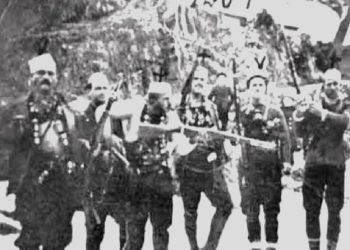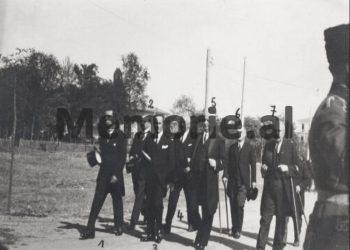Dashnor Kaloçi
Memorie.al publishes some archival documents issued by the Central State Archive in Tirana (fund of the former Central Committee of the ALP), which belong to June 1973, when the IV Plenum of the Committee was held in Tirana Central of the ALP, where Enver Hoxha held the main report on “To deepen the ideological struggle against foreign performances and liberal attitudes towards them.” The unknown speech of Enver Hoxha, which was held mainly only for art and culture and became the “guillotine” of writers and artists, as there were “cut off many heads” of them, initially being fired from the duties and functions they had had until then, to be completed later in the most remote villages of Albania, in mines and construction sites, as well as prisons and internments of the communist regime of Enver Hoxha, such as: Fadil Paçrami, Todi Lubonja, Mihallaq Luarasi, Lluk Kaçaj, Sherif Merdani, Minush Jero, Kujtim Spahivogli, Ibrahim Uruçi, Dhimitër Shuteriqi, Edi Luarasi, Zhani Ciko, Leka Bungo, Bujar Kapexhiu, Novruz Yzeiri, Dorjan Nini, Francesk Radi, Justina Aliaj, Vilson Kilica, Hamide Stringa, etc.
“Phenomena of this nature have been observed in light music, especially in rhythmic music, where there have been deformations of the clear melodic line and the way has been opened to unbridled rhythms. This was especially evident at the 11th Radio-Television Song Festival. Our whole social opinion indignantly rejected that vulgar music, those despised songs and that snobbish performance that this festival brought us on stage. He rightly considers and condemns it as an insult to the best national tradition, popular spirit and partisanship of our art. Such foreign performances have also appeared in some paintings, in the stage presentation of a theatrical and operatic work, on the covers of books, etc. Such deviations have directly affected both the form and the interior of our literature and art. These perverse tendencies are at odds with the partisanship of literature and art, with their formative and educational role, with their popular and national character. “They put a barrier between art and the people, fade the democratic nature that our art should have, spoil the tastes of the working masses.”
This is what Enver Hoxha said, among other things, in his speech held at the IV Plenum of the Central Committee of the ALP, which took place on June 26 and 27, 1973, which was held mainly only for the art of culture and became the “guillotine” of writers and artists, as there were “cut off many heads” of them, initially being dismissed from the tasks and functions they had held until then, to then end up in the most remote villages of Albania, in mines and construction sites, as well as prisons and internments of the communist regime of Enver Hoxha, such as: Fadil Paçrami, Todi Lubonja, Mihallaq Luarasi, Lluk Kaçaj, Sherif Merdani, Minush Jero, Ibrahim Uruçi, Dhimitër Shuteriqi, Edi Luarasi, Zhani Ciko, Leka Bungo, Bujar Kapexhiu, Novruz Yzeiri, Dorjan Nini, Francesk Radi, Justina Aliaj, Vilson Kilica, Hamide Stringa, etc., where most of them were released from prison or returned to Tirana only after the fall of the regime communist in the early 1990s.
For more than what was said by Enver Hoxha in the IV Plenum of the Central Committee of the ALP, we know the archival document that Memorie.al is publishing for the first time in several parts (with some abbreviations), starting from today’s writing.
Speech of Enver Hoxha at the IV Plenum of the Central Committee of the ALP, held in Tirana on 26 and 27 June 1973
Comrades, This Plenum of the Central Committee is devoted to a great and vital problem for the Party and for the question of socialist construction: the problem of fighting against the influences of foreign bourgeois and revisionist ideology, for the rooting of proletarian ideology on all fronts, in every time and especially in the current conditions of the hostile imperialist-revisionist siege of the country. These problems, which we have constantly faced, have recently become more acute, and therefore have attracted the special attention of the Party and all working masses. The party boldly criticized with Marxist-Leninist principality many foreign performances, which had appeared in some spheres of our social life, as a result of the influences of the old society and especially the pressure of the capitalist and revisionist world.
The measures taken to combat these negative phenomena constitute a further important step in deepening the process of revolutionization of the entire life of the country. Although a relatively short time has passed since the Party raised these issues before the whole people, it is noted with satisfaction that a great deal of work has been done and very positive results have been achieved in all areas. In the first place, the deep understanding, unanimous approval and readiness expressed on this occasion by the communists, the working class, the youth and all workers must be noted. Now, everywhere, a lively atmosphere of debate and confrontation has been created to criticize the shortcomings, to discover the weaknesses and foreign performances in the work centers, in the cultural and artistic institutions, in the schools and in the family, to determine the effective ways of overcoming them. . In the city and in the countryside a healthy spirit of mobilization is being created for the realization of the plan and for the performance of duties, for the strengthening of the proletarian discipline at work and for the protection of the wealth of the people. Ideological and political vigilance against internal and external enemies and military preparation for the defense of the homeland has been raised to a new higher level.
In this revolutionary atmosphere have erupted a series of valuable initiatives in the field of production, ideologies and culture, etc. They are a concrete expression of the true meaning of the internal and external situations in which we live, of the high moral qualities which the Party has ingrained in the working people, of its steely unity around the Party, and of its straight Marxist line. -lenist. All of these are a premise and guarantee of even greater success in the future. But we can not be satisfied with what has been achieved, nor can we think that the problems recently raised by the Party have already been fully resolved. On the contrary, it is necessary to dwell and delve even further in some important directions of the class struggle in order to destroy all the influences of foreign ideology, past and present, bourgeois and revisionist, in order to strengthen even more. the dictatorship of the proletariat, to advance unceasingly our revolution and our socialist construction.
Enver Hoxha: Strengthening the proletarian partisanship, a necessary condition for the development of literature and arts
The party has shown a constant care for the development of literature and the arts and has always considered them as powerful tools for the communist education of the masses, especially for their ideo-aesthetic formation. Literature and arts have taken a step with the whole development of the life of the country, with the deepening of the ideological and cultural revolution and have given a great contribution for the formation and education of the young man, for the raising to a higher degree of our culture. new socialists. Our writers and artists, guided by the teachings of the Party, loyal to Marxism-Leninism, have created inspired works with a sound brand. Our art with socialist and revolutionary content has the national stamp, expresses the consciousness of our people in the great historical moments that we have gone through and are going through. This art is liked by the masses and is a spiritual food for them. People love and respect their writers and artists. The successes of literature and art speak clearly of the revitalization of the method of socialist realism, of its basic principle, of proletarian partisanship, of its harmonization with the popular and national spirit and of the sound realist tradition. The development of the arts, like that of the whole spiritual life of our society, has been done in war with foreign ideological influences old and new, conservative and modernist, especially with the bourgeois-revisionist ones.
Of particular importance in this war were the orientations of the 15th Plenum of 1965 of the Central Committee. But in recent years, as a result of the pressure of foreign ideology, and especially of weaknesses of a subjective character, in literature, art and culture some open influences of bourgeois and revisionist ideology have been noticed, liberal attitudes have been maintained towards them. They have harmed the development of our literature and arts. In all the discussions that have taken place, the danger posed by these foreign influences, as a means of imperialist-revisionist ideological diversion, has been pointed out, in order to divert literature and art from the right revolutionary path of socialist realism and from the sound national sole. , to avoid them from the Party line and from its right orientations.
In the spread of these influences, imitations of foreign models, of old and new decadent and modernist currents, open and mechanical copies of today’s bourgeois and revisionist artistic fashion, as well as misconceptions of processes of our internal development, which also have their source in the gaps in the political, ideological and professional formation of some creators. In some works of literature and art, drama, poetry and poems, stories and novels, in a film, etc., the reality has been distorted. The various contradictions and the struggle waged by the Party and the people against the negative phenomena, obstacles and difficulties have been reflected not from the positions of the Party, but from positions opposite to them.
Thus, in many cases the fight against bureaucracy is given wrong in its essence, our organs of power appear stifled by bureaucracy and the working masses completely powerless in the fight against bureaucrats. In some dramas and other literary works the contradictions among the people are also treated crookedly. In the name of the “new”, the aim is to deny the present and the war between the old and the new is presented as an inevitable war between the generations. Foreign influences have gone so far as to obscure in any story the grandeur of the National Liberation War and partisan heroism. The consequence of foreign influences is also the excessive capture of small intimate topics, the escape from big social problems, the topic of human loneliness, when it turned into a ‘snail’, a ‘sea fig’ and other absurdities, phenomena related to the influence of existentialist philosophy and aesthetics, as well as literary currents, such as symbolism, etc. These phenomena, which have been observed in some poems and stories, in lyrics, in some paintings, etc., are contrary to the revolutionary militant spirit of our literature and art, to their civic pathos and to their epic character.
In poetry there is a tendency to use a dark figuration in contradiction with the tradition of such clear Albanian poetry. Few young poets began to adopt hermeticism in their poems. This is completely foreign to our literature, to our people of a socialist country with a proletarian democracy. The dark writings from the inside of the form are the offspring of the perverted thoughts and feelings of the people ruled by the regime of capital, oppression and human exploitation, national oppression and lack of freedom of expression. Phenomena of this nature have also been observed in light music, especially in rhythmic music, where there have been distortions of the clear melodic line and the way has been opened to unbridled rhythms. This was especially evident at the 11th Radio-Television Song Festival.
Our whole social opinion indignantly rejected that vulgar music, those despised songs and that snobbish performance that this festival brought us on stage. He rightly considers and condemns it as an insult to the best national tradition, popular spirit and partisanship of our art. Such foreign performances have also appeared in some paintings, in the stage presentation of a theatrical and operatic work, on the covers of books, etc. Such deviations have directly affected both the form and the interior of our literature and art. These perverse tendencies are at odds with the partisanship of literature and art, with their formative and educational role, with their popular and national character. They put a barrier between art and the people, fade the democratic nature that our art should have, spoil the tastes of the working masses.
The basic reason for the spread of these foreign influences is the inconsistent implementation and departure from the right orientation of the Party for the development of a frontal ideological war, on both sides, both against conservatism and against liberalism. The risk of today’s influences of bourgeois and revisionist ideology has been underestimated by some employees and executives of the culture, literature and arts sector. The only current danger in practice is considered only a few shows and old traditions of a conservative character, while the liberal one is seen only as an opportunity. Simplifying the risk of bourgeois-revisionist influences, especially when it is done by “learned” intellectuals, is not a forgetfulness, but a tendency, a tendency which, if not fought, makes obesity dangerous.
The influence of the liberal-modernist discourse is not a potential danger, but a real danger. Some elements, infected by decadent modernism, disguising themselves as “competent” people, under the guise of the struggle against conservatism, tried to open the doors to anti-proletarian liberalism, to foreign bourgeois-revisionist currents. Those with bodies were here, but their minds and hearts were out. They looked back at the life and development of our country and the decadent currents sought to adapt to our situation. These elements cast the divisive thesis that true literature’s supposedly beginning in the ‘60s, thus denigrating and denying previous artistic creativity. In the name of criticism against conservatism they shifted the edge of the war against some creators as persons, especially against the older ones, severely damaging the social atmosphere in the literary-artistic circles.
Theories against so-called conservatism, in different genres of art have appeared in different forms. In the fine arts, often with the slogans of the fight against schoolism, academia, naturalism, etc., not only were justified, but also taken as models of creative courage and innovation works with foreign modernist influences, old and new, and even borrowed from Impressionism and kubizmi. In music conservatism is called the predominance of melody, just as archaism and folklore are called the reliance on the musical creativity of the people. This so-called folklorism has often been presented as a gogol and as a major obstacle to the development of cultivated music. In recent years there has been an underestimation of the best traditions of folk music, which is reflected in its insufficient execution by the best artists and especially in the lack of serious work to prepare new talent. This underestimation can not be taken apart from a preference that some people have had for the so-called: dynamic and rhythmic music, which’s supposedly modern modern music, the only one that responded to the “demands of time and youth.” .
No, we do not need new music like this. It only needs the bourgeoisie and the revisionists as a narcotic to stun the masses, especially the young. Our youth needs a pure spiritual food, truly of the time, but imbued with high ideals and sound spirit. And our talented composers have created many beautiful and original works with a revolutionary, national spirit of the time. They sing with inspiration and love to the homeland of the people, the Albanian nature, the socialist life and the pure feelings of our people. In the speculations about archaism, folklore, etc., let us deal with an openly contemptuous attitude towards folklore in general, towards its great social artistic values, towards its relationship with cultivated art.
It is precisely such attitudes and theories that have been one of the causes of departures from the sound national sole and have served as arguments to justify these departures. To everything good and beautiful popular these pseudo-theorists affixed contemptuous labels, many times incomprehensible even by themselves, Some were current bourgeois terms in the literature that the course of time itself had thrown into the channels. These so-called modern aesthetes attached importance to reform and not at all to ideology, politics, the interior. Elements with liberal tendencies have often identified conservatism with tradition. They mechanically divided today’s literary and artistic phenomena into “traditional” or “innovative”. Such confusions and divisions pave the way for the denial of tradition, its sound sides. Foreign influences spread more easily over this bed.
These people, of course, could not rely on tradition, which they called regression, but on so-called innovation, which they called progress. The party has repeatedly stressed the need to rely on sound traditions and cultivate them further. It has highlighted the great values of the best cultural traditions, their patriotic and democratic popular spirit. But for us the tradition is not only the powerful tradition of the patriotic literature of the National Renaissance, of the progressive democratic and revolutionary literature of the pre-liberation, but also the very rich and diverse thirty-year tradition of our literature and art of socialist realism. Do not serve the precious creations of our most famous poets, from the songs of the National Liberation War, “Epopee of the National Front” by Shevqet Musaraj, the poems of Llazar Siliq, etc., as well as the rich and sound creativity of many poets of young people, as a clear example of opposition to the perversions that have been observed recently in poetry and that we are rightly strongly criticizing?
How much our poets have increased the value of the always powerful and wonderful word of the best Albanian poetry! It has not been long since I read the latest summary of Dritëro Agolli’s poetic creativity. Is not the creativity of this poet a new tradition, an example of the harmonization of the revolutionary socialist spirit with the popular national spirit, of the rich interior and clear form, of partisanship and of high artistic mastery? Many other outstanding literary-artistic works have been created during the last period. In the best novels of Sterjo Spasses and Ismail Kadare, Fatmir Gjata and Jakov Xoxe, as well as other prose writers, the struggle of the people for liberation from the oppression of foreigners and the centuries-old exploitation for the construction is reflected with truly epic greatness. of the new socialist society, for the formation and education of the young man.
Even playwrights and filmmakers, along with talented stage and screen artists, have beautifully reflected these colossal transformations in their best dramas, films and performances. We see this greatness and this heroic spirit of war in the most outstanding works of our talented sculptors and painters, such as: Odhise Paskali, Kristaq Rama, Guri Madhi and others. Composers such as: Çesk Zadeja, Tish Daija, Feim Ibrahimi and others have given very beautiful works of various musical genres, large and small, with a sound brand, with educational values, with a high professional level. We have the right to be proud of the good creations of our literature and art that stand out both for their militant spirit and for a truly high artistic mastery. Emphasizing these great achievements in these fields we can not but accept that our literary-artistic criticism and science are indebted to the generalization of this new experience of socialist artistic culture, of these successes and new powerful traditions of literature and art. of socialist realism. We must fight for this tradition to become the property of young creators and of the broad masses of art lovers, for it to be popularized with publications and reprints, recordings, reproductions, etc.
Young creators must be taught and educated to rely on our results and our new experience to follow this rich socialist tradition. Avoiding gaps and underestimations in this area is also a means of closing the paths to the spread of foreign influences and imitations. The party has been and is for an innovative art, to rely strongly on the sound old and new tradition and on the proletarian partisanship. But even in this issue there have been distortions and theorizing of a liberal character. Often, mechanically, anything that comes out new, without analyzing it in the class prism and scientifically what it represents, is called innovative, creating theoretical confusion, as happened with a “famous” discussion of the hero positive in literature, developed in the newspaper “Drita”.
Innovation has sometimes been considered the property of only young people. Other times it is not looked primarily primarily at content, but only at form. Exactly in the name of such an “innovation” are justified those formalist and modernist creations in poetry, light music, painting, directing, scenography, etc., which I spoke about above. In particular, it has been speculated in the name of supporting young people, ostensibly maintaining a benevolent and tactful attitude towards them. Such an attitude has only harmed young people, as they are actually helped not by petting them, but by encouraging them when necessary and criticizing them when necessary. For us, Marxists-Leninists, the new is what serves the destruction of everything obsolete, regressive and reactionary, of everything foreign to our society and ideology, it is what serves the affirmation of everything progressive and revolutionary, the development of socialist society, of its basis and superstructure, of production and of spiritual life.
We always see the new, first of all, inside and then in shape. This is how we see it in both literature and art. Our party, which is a great and courageous innovator, fearless revolutionary, which has escalated and continues to escalate age after age, which leads an unprecedented revolution in the material and spiritual life of society, will never allow itself to be deceived. from the false innovation, from the outer beauty of bourgeois and revisionist art and culture, with which they clothe the poison of their reactionary ideas, from the sensational advertisement they make to the so-called innovations of this culture. Our party is for a truly modern development of all our social life, economy and culture, literature and art. But this has nothing to do with the perverted modernity of today’s capitalist and revisionist world.
Many of the evasions we are criticizing have come from departing from the national spirit, from ignoring and denying it. In the name of the new, of the demands of the time, of what we live in Europe, the supporters of liberalism began to distort the Party’s orientations for the differentiated critical attitude towards foreign culture and to serve us as new and innovative the ugliness of today’s culture decadent and bourgeois-revisionist modernists. Through many storms of time, fierce and endless battles our people created a culture and art with a clear national physiognomy that constitutes an invaluable asset. These values of the progressive art of our nation are for us an object of legitimate pride, they are our contribution to the treasury of the progressive world culture. If for centuries our people preserved and further developed this culture, then we, the generations of socialist society, have the burden to fight with the passion of the communist militant, to keep it clean and to develop it further./Memorie.al
Continues in the next issue




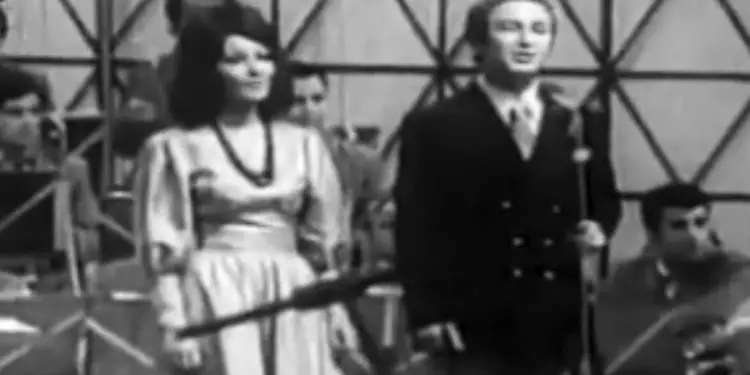
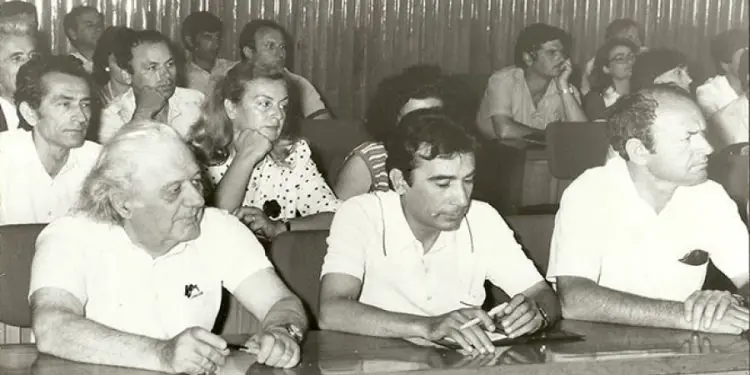
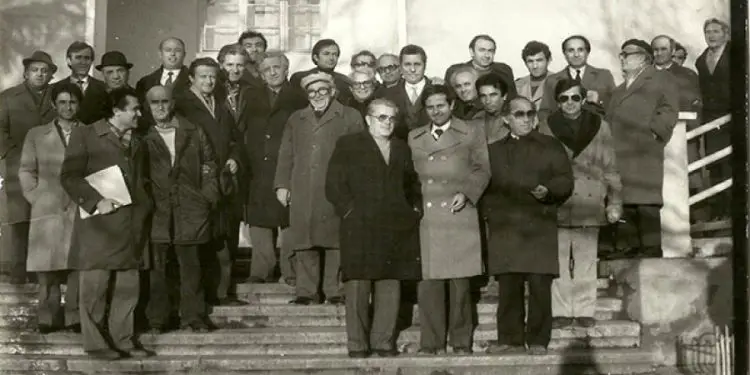
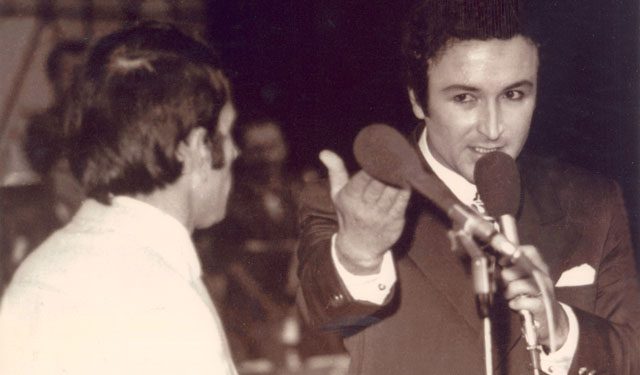
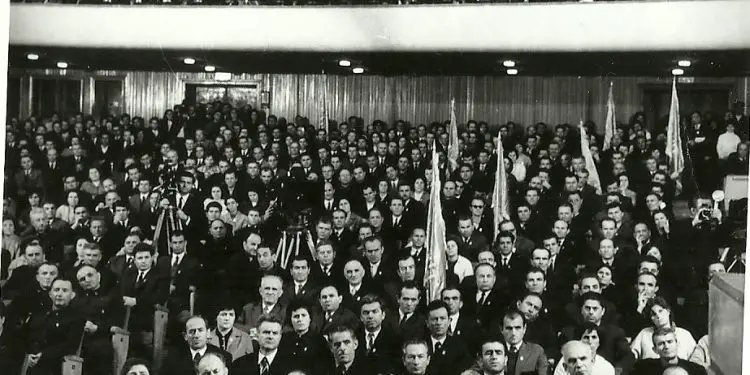
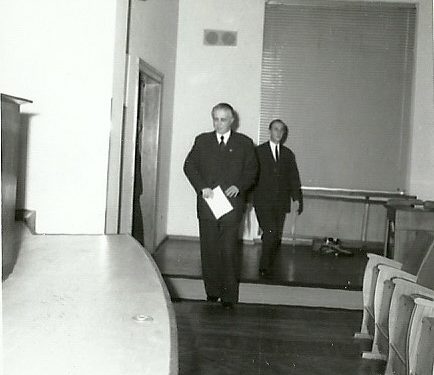
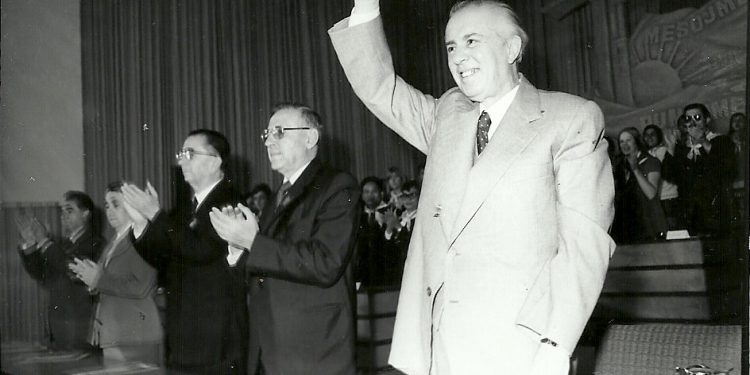
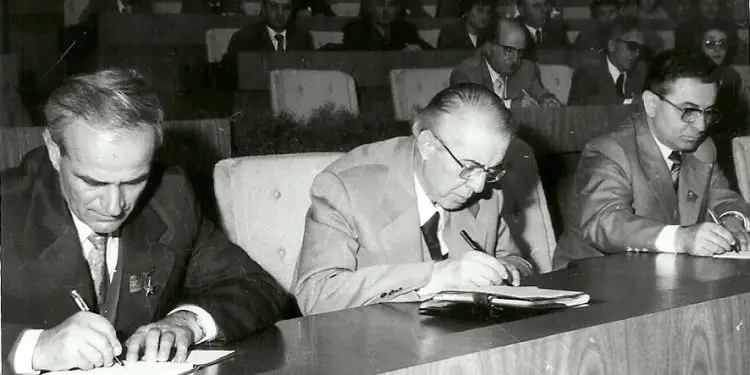
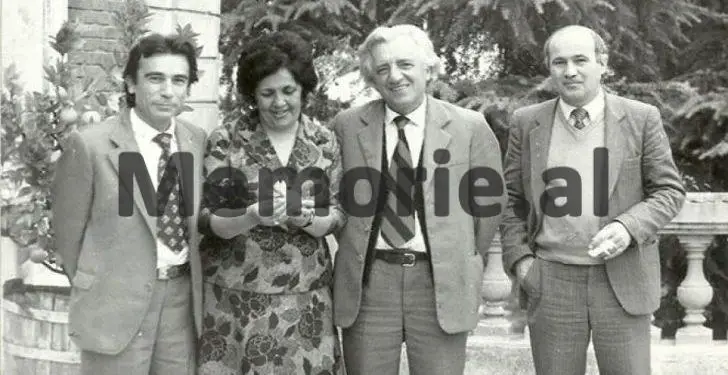
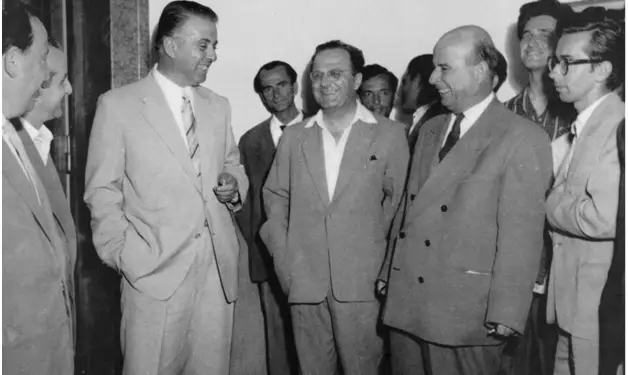
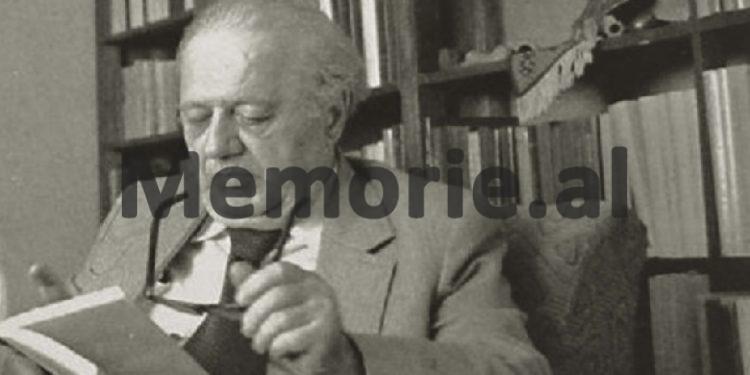
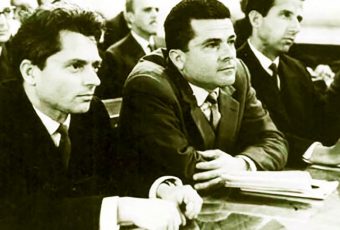
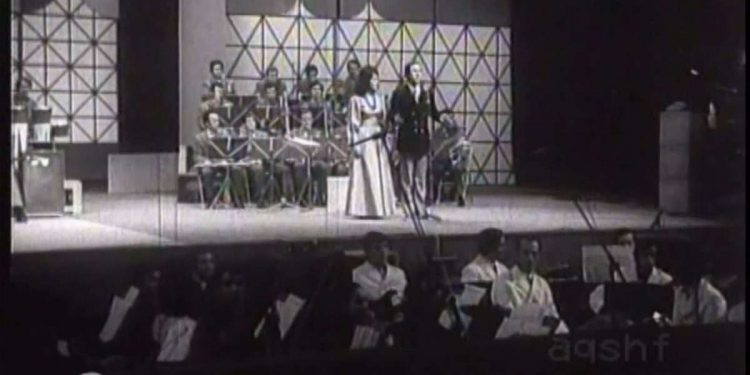

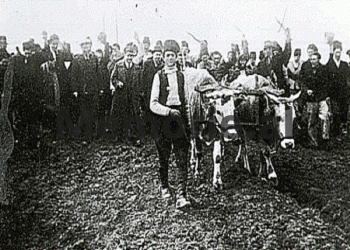
![“They have given her [the permission], but if possible, they should revoke it, as I believe it shouldn’t have been granted. I don’t know what she’s up to now…” / Enver Hoxha’s letter uncovered regarding a martyr’s mother seeking to visit Turkey.](https://memorie.al/wp-content/uploads/2026/01/Dok-1-350x250.jpg)


